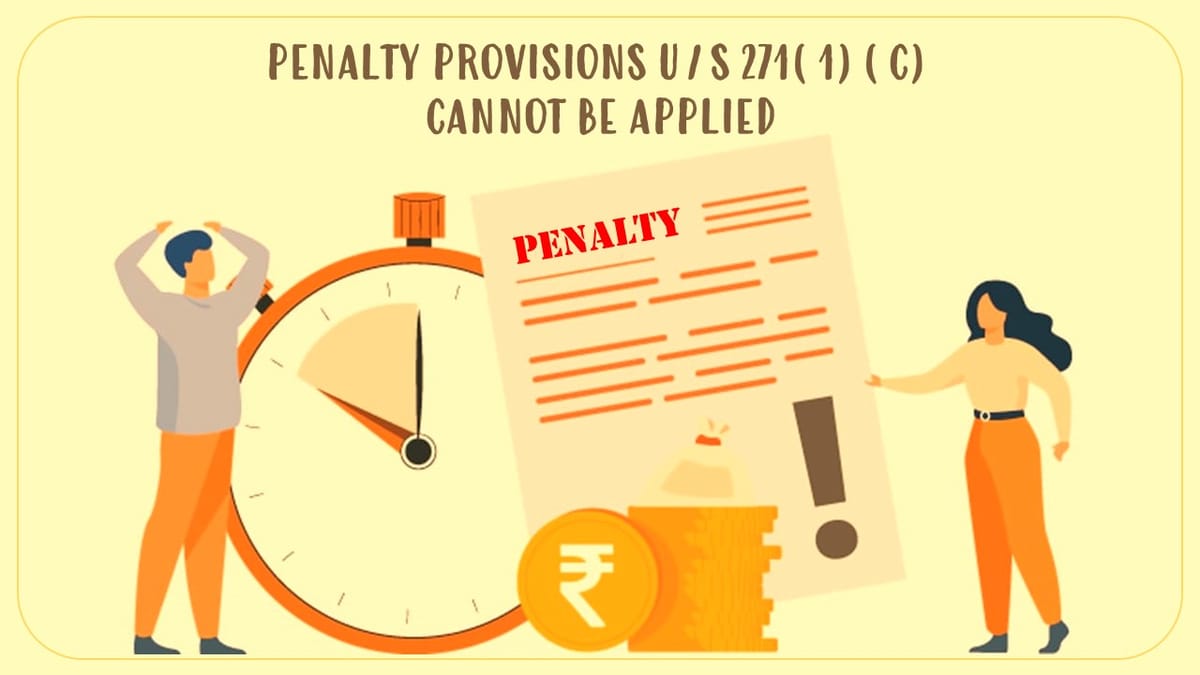The ITAT Chennai has held that Penalty provisions u/s 271(1)(c) cannot be applied when quantum addition are made by applying peak credit theory.
Reetu | Jul 30, 2023 |

Penalty provisions u/s 271(1)(c) cannot be applied when quantum addition are made by applying peak credit theory
The Income Tax Appellate Tribunal(ITAT Chennai) in the matter of Edward Sam Vs. The Income Tax Officer has held that Penalty provisions u/s 271(1)(c) cannot be applied when quantum addition are made by applying peak credit theory.
Brief facts of the case are that the assessee is a retired employee of BHEL and filed his return of income for the assessment year 2011-12 on 06.07.2011 admitting an income of Rs.5,92,178/- after deducting house property loss of Rs.53,981/-. The case has been selected for scrutiny since the assessee had a cash deposit of Rs.27,31,700/- in BHEL Employees Co-operative Bank Ltd., Trichy. After considering the submissions and details against statutory notices, the Assessing Officer has completed the assessment under section 143(3) of the Act dated 27.02.2014 assessing total income of the assessee at Rs.29,92,180/- by making addition of Rs.25,00,000/- under section 69A of the Act. Against the quantum addition, the assessee had preferred an Appeal before the ld. CIT(A). After considering the submissions of the assessee, the ld. CIT(A) partly allowed the appeal of the assessee by sustaining the addition to the extent of Rs.9,73,250/- as peak credit and Rs.3,00,000/- as personal cash consumption and directed to recompute the income.
Subsequently, the Assessing Officer has initiated penalty proceedings under section 271(1)(c) of the Act by issuing a letter on 16.10.2019 seeking explanation from the assessee as to why a penalty shall not be levied. Since the assessee could not respond to the notice, based on the details, the Assessing Officer levied penalty of Rs.3,95,137/- under section 271(1)(c) of the Act. On appeal, the ld. CIT(A) confirmed the penalty levied under section 271(1)(c) of the Act.
On being aggrieved, the assessee is in appeal before the Tribunal. The ld. Counsel for the assessee has submitted that against quantum addition, by applying peak credit theory, the ld. CIT(A) has granted relief on estimated basis based on the details furnished by the assessee and therefore, provisions under section 271(1)(c) of the Act has no application and prayed for deleting the penalty levied by the Assessing Officer and confirmed by the ld. CIT(A).
On the other hand, the ld. DR has supported the orders of authorities below.
We have heard both the sides, perused the materials available on record and gone through the orders of authorities below. During the course of assessment proceedings, the Assessing Officer noted that the assessee had a cash credit of Rs.25,00,000/- with BHEL Employees Cooperative Bank account and such credit was made on 03.02.2011, 04.02.2011, 08.02.2011 & 10.02.2011. Since the assessee has not offered any convincing explanation, the Assessing Officer added the entire sum of credit in the BHEL Employees Cooperative Bank account of Rs.25,00,000/- under section 69A of the Act. On appeal, by restricting the addition to the extent of Rs.12,73,250/-, the ld.CIT(A) added the peak credit of Rs.9,73,250/- to the declared income and moreover granted relief of Rs.3,00,000/- being personal and house hold expenses, which was accepted by the assessee and no further appeal was preferred against the order of the ld. CIT(A). However, the Assessing Officer initiated penalty proceedings and levied penalty under section 271(1)(c) of the Act, which was confirmed by the ld. CIT(A).
Before us, the ld. Counsel for the assessee has contended that by applying peak credit theory, the ld. CIT(A) has granted relief on estimated basis based on the details furnished by the assessee and therefore, there was no concealment of income or furnishing of inaccurate particulars and thus, the provisions of section 271(1)(c) of the Act has no application. We find force in the argument of the ld. Counsel. Against the quantum addition, once the ld. CIT(A) has determined the unexplained cash credit by considering the peak credit amount deposited, which is nothing but an estimated credit, the Assessing Officer was not legally and factually correct to levy penalty under section 271(1)(c) of the Act. Accordingly, the penalty levied under section 271(1)(c) of the Act stands deleted.
In the result, the appeal filed by the assessee is allowed.
For Official Judgment Download PDF Given Below:
In case of any Doubt regarding Membership you can mail us at contact@studycafe.in
Join Studycafe's WhatsApp Group or Telegram Channel for Latest Updates on Government Job, Sarkari Naukri, Private Jobs, Income Tax, GST, Companies Act, Judgements and CA, CS, ICWA, and MUCH MORE!"